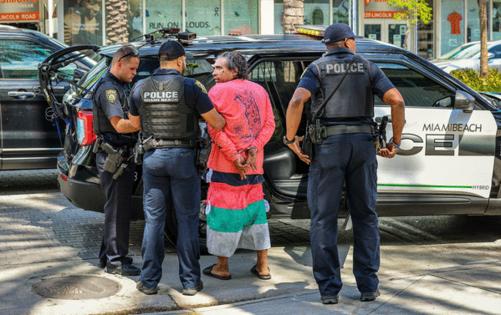In Miami Beach, more than 40% of people arrested in 2024 were homeless
Published in News & Features
MIAMI — More than four in 10 arrests by Miami Beach police in 2024 were of homeless people amid the city’s crackdown on outdoor sleeping and escalating efforts to get people off the streets.
According to data from the Miami Beach Police Department, 42% of all arrests last year were of homeless defendants, an increase from recent years. In comparison, across Miami-Dade County, just over 10% of all people booked into county jails in 2024 were classified as homeless, according to data from the county’s corrections department.
Last year’s spike came after the Miami Beach City Commission voted in October 2023 to strengthen an anti-camping ordinance, giving police the power to arrest homeless people who refuse a shelter bed. In addition to the camping ban, the city has beefed up a municipal prosecution team that focuses largely on “quality of life” offenses for which homeless people are often arrested.
The effects are noticeable in some tourist-heavy areas of South Beach.
Along the Lincoln Road shopping mall, only a handful of homeless people were visible during a recent evening in an area that had previously seen high concentrations of homeless individuals. Multiple police cars were stationed at each intersection, and cops patrolled the outdoor mall in a golf cart.
Miami Beach officials have sought to discourage homeless people from gathering on Lincoln Road, including by deactivating electrical outlets to prevent people from charging their phones.
Alberto Silveira, who markets tourist experiences from inside a Surf Style shop on the mall, said he has seen a marked decrease in the homeless population there in recent months.
“One day it disappeared,” said Silveira, 65. “They cleaned up the city.”
Orlando, a homeless man who lay against the entrance to Miami Beach Community Church on Lincoln Road, said he disagrees with the city’s policy of making arrests for sleeping outdoors. But he said it hasn’t been a problem for him since he arrived here recently from New York.
“I keep moving. If they tell me to move, I move,” he said. “They have the power. I don’t have the power.”
In response to questions from the Miami Herald, Miami Beach police spokesperson Christopher Bess said the high proportion of arrests of the homeless hasn’t affected the department’s capacity to address serious criminal activity and other issues across the city.
“Miami Beach police officers are committed to upholding all local and state laws whenever probable cause is established,” Bess said.
Arrests of the homeless have become increasingly common in Miami Beach in recent years, making up about one-quarter of arrests citywide in 2021 and about one-third in 2022 and 2023, according to annual figures from the police department.
Homeless advocates said the 42% figure from 2024 is striking in a city where, according to an overnight count from August, there were just 132 unsheltered homeless people among Miami Beach’s population of about 80,000 residents.
“It’s way disproportionate to the percentage of people in Miami Beach who are homeless,” said Stephen Schnably, a University of Miami law professor who studies homelessness. “I think it reflects, in part, the politics there of a very ‘get tough on crime’ kind of platform that a number of the leaders were elected on.”
Earlier this month, an overnight count by city officials identified 107 unsheltered individuals citywide. Officials said the number was lower because of the emergency placement of about two dozen people into shelters due to cold temperatures, but they still reflect a decline from one year earlier and a substantial decrease from the 235 unsheltered people counted by the Miami-Dade Homeless Trust in January 2023.
The Homeless Trust, the county’s homeless services agency, will conduct its official count of the unsheltered population before the month is over.
Miami Beach Commissioner Alex Fernandez said the results of the recent city count point to the effectiveness of the city’s approach, which includes enforcement as well as homeless outreach services like a walk-in center, shelter placements and family reunification programs.
“This didn’t happen by accident and it’s the result of our focused strategy that balances compassion with accountability,” Fernandez told the Herald in a text message.
But homeless advocates aren’t convinced. Schnably said the spike in arrests may drive homeless people away from Miami Beach but doesn’t necessarily mean they are being placed into permanent housing.
“The danger is that people who are experiencing homelessness in Miami Beach will become much less visible because they were driven out, and city leadership will say it’s a success,” Schnably said. “It doesn’t deal with the lack of housing. It just pushes people around.”
How are homeless people being charged?
Miami Beach police made more than 250 arrests for illegal camping in 2024, a sharp increase from prior years but still only a fraction of the more than 2,100 total arrests of homeless people. Among the most common charges they faced were trespassing, drinking in public, theft and drug-related crimes.
According to a Herald analysis of Miami Beach charging data from Jan. 1, 2024, to Nov. 13, 2024, more than 400 homeless people were arrested multiple times, including at least six who were arrested 10 times or more.
Homeless defendants in Miami Beach faced 191 charges for violent crimes during that span, the analysis showed, making up about 5% of the 3,613 charges they faced.
Non-homeless defendants faced 568 charges for violent crimes, or about 13% of their 4,495 charges.
The Herald used a state listing of violent offense statutes to determine whether a charge constituted a violent crime.
Bobby Hernandez, president of the Miami Beach Fraternal Order of Police, said the increase in arrests of the homeless reflects policy directives from Mayor Steven Meiner and city commissioners.
“Our mayor is a law-and-order mayor, and our commission is a law-and-order commission,” Hernandez said. “They have made homelessness enforcement a priority, and we’re complying with their request.”
Even as arrests increase, Meiner has repeatedly said the city is taking a compassionate approach to homelessness while prioritizing public safety.
“While we treat homeless individuals with compassion — spending millions for shelter beds, counseling and more — it is illegal in Miami Beach to live on our streets,” Meiner said in a social media post earlier this month.
The city’s camping ban requires that people be offered an available shelter bed before they can be arrested.
There are no shelters in Miami Beach, but the city has contracts for dozens of beds in Miami. Some people refuse to enter shelters, citing negative past experiences and concerns about safety.
Bess, the police spokesperson, said Miami Beach officers had nearly 1,300 engagements with homeless people last year, leading to 56 shelter placements, 20 people being placed in treatment, 151 being referred to a provider and 115 accepting other services. More than 330 refused assistance, Bess said.
City officials say Miami Beach’s homeless population is largely transient, consisting of people who move in and out of the city and are sometimes reluctant to accept services.
A debate over effectiveness
Other cities across Florida may follow Miami Beach’s lead in 2025. Starting this month, a new state law subjects local governments to lawsuits if they fail to enforce a statewide ban on public camping.
Florida Gov. Ron DeSantis signed the bill into law at a press conference in South Beach last March, touting Miami Beach’s approach as a model.
But homeless advocates say the city’s arrests are overly harsh and ineffective. David Peery, who leads the nonprofit Miami Coalition to Advance Racial Equity and was a plaintiff in a landmark case on homelessness in the city of Miami, called the 42% arrest figure “astonishing.”
Peery and other advocates say arresting homeless people for low-level offenses like camping, trespassing and open container violations traps them in a cycle of incarceration and homelessness.
“Nearly half of all [Miami Beach] police resources now have been devoted to punishing poor people,” Peery said. “That is fiscally irresponsible and a dangerous diversion of police resources.”
Such figures aren’t unprecedented around the country. In Portland, Oregon, an analysis found that more than half of people arrested in 2017 were homeless. In San Diego, a 2023 report indicated that the majority of people in county jails had previously experienced homelessness.
“In none of these cities has this approach resulted in decreased homelessness,” said Eric Tars, senior policy director for the National Homelessness Law Center in Washington, D.C., which advocates for a housing-based approach to addressing homelessness. “The statistics must be a call to [Miami Beach] elected officials to abandon failed strategies and start doing what actually works.”
Miami Beach officials sparred with Miami and Miami-Dade officials last year over their approach to the homeless population. Tensions boiled over after Miami Beach commissioners rescinded a ballot question that would have let residents decide whether to impose a 1% sales tax dedicated to funding homeless services.
Following blowback from county leaders, Miami Beach officials agreed to direct $10 million to the county for homeless services and provide additional funding in future years.
Nationally, sheltered and unsheltered homelessness jumped 18% in 2024, according to the U.S. Department of Housing and Urban Development. Florida saw its highest homeless count since 2017 at over 31,000 people.
Last June, the U.S. Supreme Court upheld an Oregon city’s ban on outdoor sleeping, saying criminal penalties could be imposed even if a city had no shelter beds available. After the ruling, Miami Beach officials kept in place their requirement to offer shelter before making arrests for camping but said the decision would aid in their enforcement.
“With the backing of the United States Supreme Court, Miami Beach is now even better equipped to address homelessness effectively,” Meiner wrote on social media.
____
Miami Herald reporter Ana Claudia Chacin contributed to this report.
©2025 Miami Herald. Visit at miamiherald.com. Distributed by Tribune Content Agency, LLC.










Comments